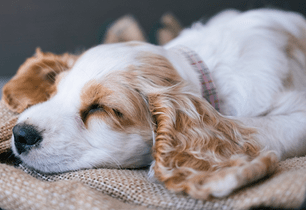
Somehow, puppies manage to be adorable even when they’re snoring. Your puppy’s snore could sound like a little snuffle or could be loud enough to hear from across the room. Either way, it may or may not be normal, so read on to find out more.
Snoring occurs due to vibrations in your puppy’s upper airways, including their nose and throat. A narrowing or blockage of the airways will change how loud the snore sounds.
Sleeping in a certain position is a relatively common reason your puppy might snore, and it’s not a cause for concern. For example, if your puppy normally curls up and sleeps quietly, but they’ve decided to sleep flopped on their back, you might notice a little snore. You’re also more likely to hear snoring in flat-faced (brachycephalic) breeds like pugs or bulldogs.
However, other causes could be contributing to your puppy’s snoring, such as swelling in their upper airway due to allergies or infection. Foreign objects, like a piece of grass, within their nasal passages could also cause snoring. Obesity may also cause narrowing of the airway passages due to fat padding. Although they’re highly unlikely to occur in a puppy at 7 months of age, masses in the upper airways can also contribute to snoring.
If your puppy develops a new snore that you’re regularly noticing, we recommend making an appointment with your veterinarian to rule out underlying medical conditions. If your puppy has snored their whole life, it may not be any cause for concern. However, for some flat-faced lifelong snorers, there may be surgical procedures that help your puppy breathe easier, both at rest and when playing. Speak with your VCA care team if you’re concerned about your puppy’s snoring.





